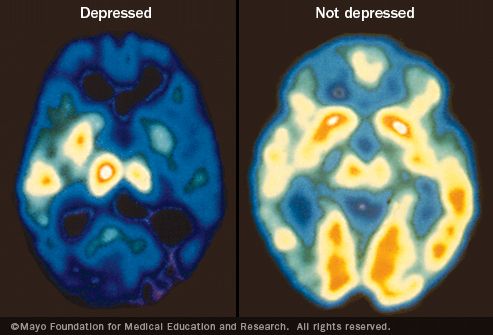This image isn't from the original article, but I think it's an interesting visualization of the physical affects of depression.
Scientists studied the rhythms of almost 12,000 genes in the brains of 55 deceased individuals, and 34 deceased people who were known depression sufferers. Their specific reason for the study was to determine if this kind of brain screening would help determine the time of death in a recently deceased person. By comparing the scans of the deceased brains with those of living tissue, they were able to match the time of death to within an hour. However, when they looked at the brain scans of the 34 people who had depression, they noticed that the rhythmic of the genes were not in sync with the regular rhythm of the circadian clock -- the brains natural sleep-wake cycle. Thus, they proved that those who have depression basically "live in a different time-zone" mentally than everyone around them. It's as if they are constantly suffering from jet-lag. This disruption affects the sleep cycle by not only offsetting their natural desire to be asleep, but might also affect the kind of sleep that they are getting when they actually fall asleep.
The findings might give researchers a better understanding of depression, possibly allowing for better treatment.
As someone who does not fully understand depression, I can't make any assumptions as to what it would be like to suffer from the disease -- or disorder. See, I don't even know what to call it. But I know enough about sleep issues to know that they can truly affect ones mood. I've also gone through jet-lag before, and I can see how living like that all day, every day, could be maddening. To feel slightly off from everyone around you. Living in a fog of tiredness that no one understands, trying to make everyone understand, but being defeated when they can't quite grasp what's going on inside your head. Or maybe even feeling cheated when someone says that they understand, but you know that they never truly could. Sure, maybe they've been jet-lagged before. Maybe it lasted a few days, and they suffered from it, mentally, emotionally, or physically. But going through the affects for days, weeks, years. That's something I can't imagine.
I would never belittle the emotional toll of depression by assuming that I know what it's like. But I appreciate that scientists are trying to understand it better, trying to do something to improve the lives of those that suffer from the disease/disorder. There may not be a "cure," but maybe this new study will give depressed people something to hope for.
-JJ

No comments:
Post a Comment